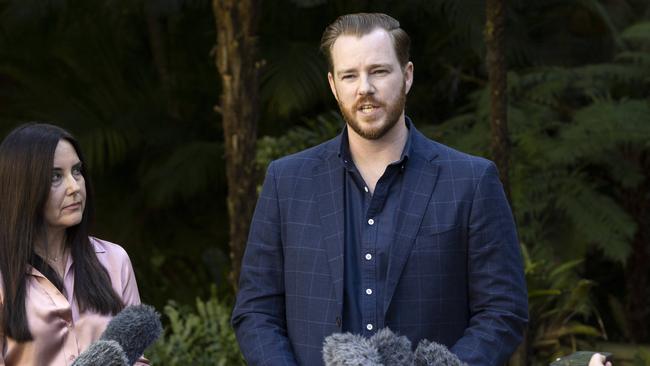PeakCare CEO backs new LNP residential care pledge
The number of children in residential care has exploded, more than doubling in the past six years. The LNP has put forward its plan to fix the overburdened system and now the peak body representing the sector is calling on Labor to step up.
QLD Votes
Don't miss out on the headlines from QLD Votes. Followed categories will be added to My News.
Foster care experts are calling on the Queensland Government to match the opposition LNP’s promises to address the crisis-ridden residential care sector.
Earlier this week, the LNP released an ambitious plan to tackle the multitude of issues across the foster sector, including spending $50 million to a build a secure care unit that would provide temporary care for high-risk children with severe mental health concerns who are danger to themselves.
The party claims it will also mandate all residential care homes roster two staff members on shift at all times, spend $27 million on a pilot program funding professional foster carers, and grown the pool of child safety officers by 20 per cent.
PeakCare CEO Tom Allsop said the LNP’s promises were desperately needed and Labor should match them.
“Queensland’s peak body for child and family services will always stand behind evidence-based policies,” he said.
“The LNP has put forward what we consider to be evidence-based policies that the sector has repeatedly called for and directly reflects our public calls for increased investment in the frontline staff who turn up every day for children and families.
Residential care homes are often the last stop for children who have experienced severe mental health and substance abuse issues, and many youth experts say it can help reducing youth crime numbers.
About 5 per cent of child in residential care are also subject to Youth Justice orders.
Mr Allsop said the secure care facility should be modelled on example set by Western Australia, housed at a hospital and be staffed by highly trained carers, looking after about six children at a given time.

“It is designed for a very small number of children with very high needs, and very strong safeguards,” he said.
“There are some young people whose behaviours present an immediate risk to themselves or others and would benefit from highly intensive therapeutic support for a limited period of time.”
“Young people in secure care cannot leave of their own free will.”
The number of children in residential care has exploded in the past 20 years, from 47 in 2004 when the model was reintroduced to cater to a shortfall in foster carers in 2004 to 1763 in 2023.
While mandating a dual staffing model for residential care was also high on PeakCare’s wish list, Mr Allsop said it could only be achieved if the number of placements was reined in.
“It is not the norm, particularly for overnight shifts, it is the one of the most consistently raised issues across the sector,”
“Particularly for overnight shifts.
“Organisations have reported concerns that if a child goes missing at night, staff members can’t go to a police station to make a missing-person report because they can’t leave the other children at the home unattended.”
Mr Allsop said the dual staff model would work if whoever wins government was committed to significantly reducing the number of children in residential care by investing in contemporary family-based care models and through early intervention, by better funding and supporting education, drug and alcohol counselling and mental health services.
“It is not just a workforce issue, it is an overuse of an intensive model that was never designed for this many children resulting from a sustained lack of investment in contemporary models of family-based care,” he said.
“We know the best outcomes for the majority of children come from family-based care.”
When asked about the LNP policy, Child Safety Minister Charis Mullen said it was underfunded.
“The Miles Government already has a fully-funded $500 million Putting Queensland Kids First Plan firmly aimed at stopping small problems becoming big ones.
“And we’ve increased full time Child Safety Officer positions by nearly 60 per cent to 1403 officers, with funding locked in for another 65 front line and support staff in child safety.
“Analysis of the LNP’s costings reveals it is $41 million short of being able to increase child safety officers by 20 per cent.
“Their costings show they would have to cut 103 child safety officers – from their own commitment. Or, perhaps they are planning on requiring all child safety officers to take a pay cut of approximately $36,000 a year?
“The LNP can’t be trusted and will only ever cut, just like when they sacked 225 child safety workers and slashed $200 million from the child safety system.”
Originally published as PeakCare CEO backs new LNP residential care pledge



